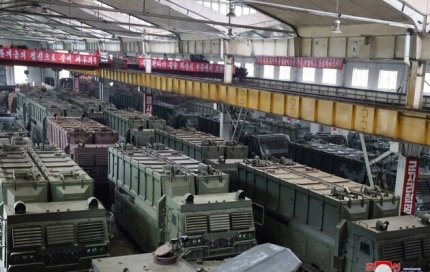According to the adviser to the head of the President's Office, Mykhailo Podolyak, in an interview with Channel 24 journalists, the aggressor country of Russia currently has a big problem with the production of missiles and ammunition.
Points of attention
- Mykhailo Podolyak highlights Russia's key problem in the war against Ukraine as the shortage of missiles and ammunition, which could affect the outcome of the conflict.
- European countries are facing delays in expanding aid to Ukraine due to bureaucracy and reduced interest in defense production, hindering the support needed in the ongoing conflict.
- The lack of global international law to deter aggressive behavior by countries like Russia poses a significant challenge in preventing conflicts and aggression worldwide.
- Podolyak emphasizes the need for Western countries to reinvest in defense production after the collapse of the USSR, as backward countries like North Korea continue to focus solely on weapon production.
- The imbalance in the world arms market compared to Russia and North Korea makes it difficult to control aggression, with Russia's alleged modernized weapon production being questioned by Podolyak.
The shortage of missiles and ammunition is growing in Russia. How will it affect the war against Ukraine
Podolyak pointed out that the alleged modernized large-scale production of missiles and ammunition in Russia, which supposedly outweighs the defense potential of Western countries, is just a fiction.
Currently, according to him, Russia still has a certain resource, which is compensated by the supply of weapons from the DPRK, but these resources are already significantly limited.

Russia has problems with projectiles and rocket production. Is Europe starting to increase the number of investments? Yes, significantly. Is it a quick process? No. And why not fast? Not because Europeans don't understand the risks, and not because they don't want to. All because of bureaucracy. Huge and collective irresponsibility, - explains Podolyak.
The adviser to the head of the OP noted that due to the bureaucracy and such pro-Russian countries as Hungary, the process of expanding the defense industry in Europe has slowed down significantly.
This is Russia fighting, let's say, in an archaic method - quantitatively. There is no sense in fighting such a large country "number against number". We have already talked about it more than once. And the European, not even the American, military-industrial complex is much more technological. This is a much more advanced weapon, - emphasizes Podolyak.
Why Western partners are too slow to extend aid to Ukraine
Podolyak noted that after the collapse of the USSR and the end of the Cold War, Western countries actually stopped investing in defense production.
The democratic world at all did not understand why they should finance armies. We saw what was happening in Europe - they significantly reduced the percentage that they had to give to NATO and the percentage to finance their own army and military production. And backward countries, like North Korea, did not invest in any welfare, only in the production of shells and missiles. And Russia is the same, - emphasizes the adviser to the head of the OP.
According to him, at the moment there are quite a few tools on the world arms market that could match the amount of weapons accumulated by Russia and the DPRK.
Because there is no fuse that should stop Russia. Today, the same excesses in the Middle East, this maximally aggressive behavior of the same Yemeni Houthis, and so on. This is a direct consequence of the fact that there is no global international law, there are no instruments of coercion to observe the law, Podolyak is convinced.




